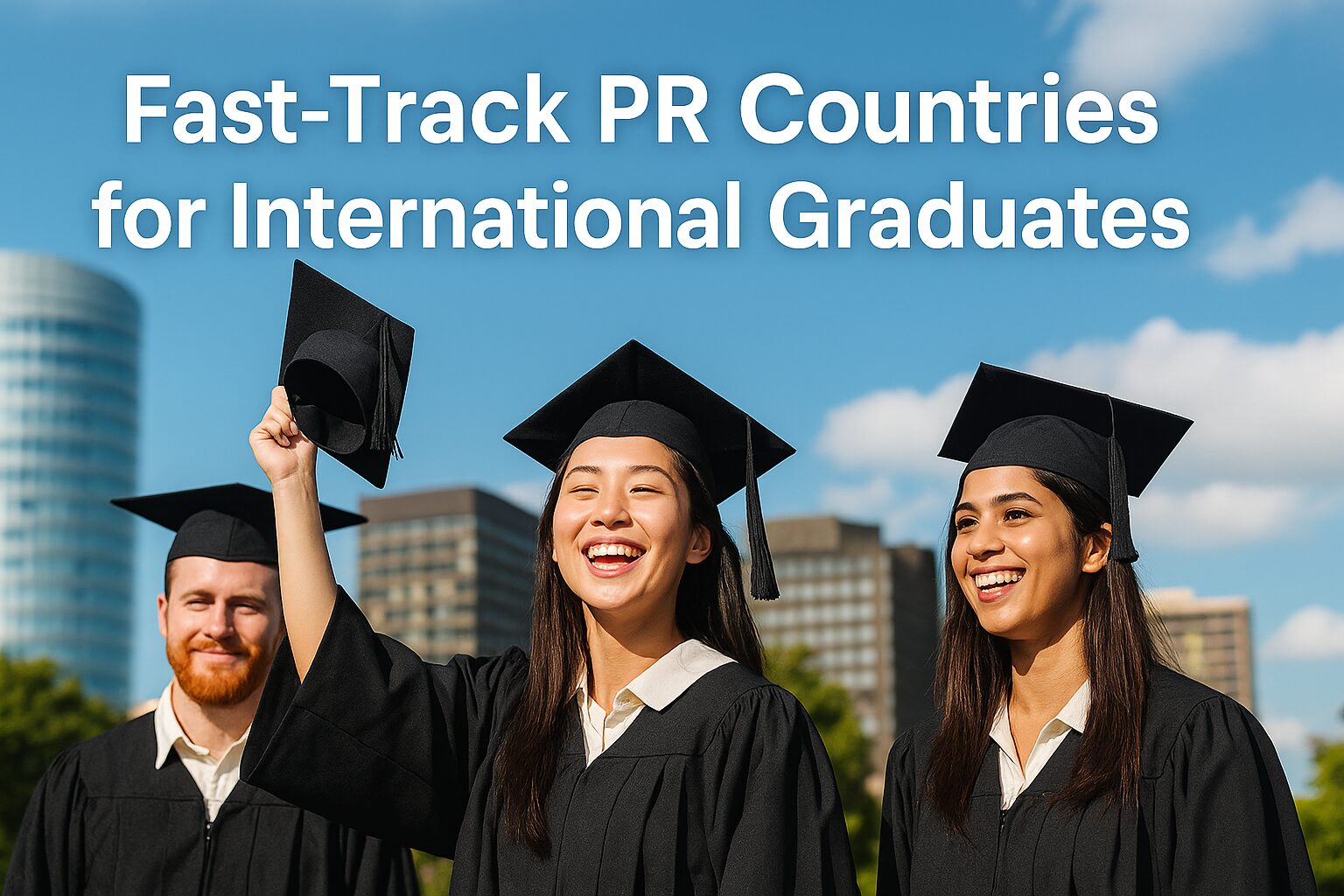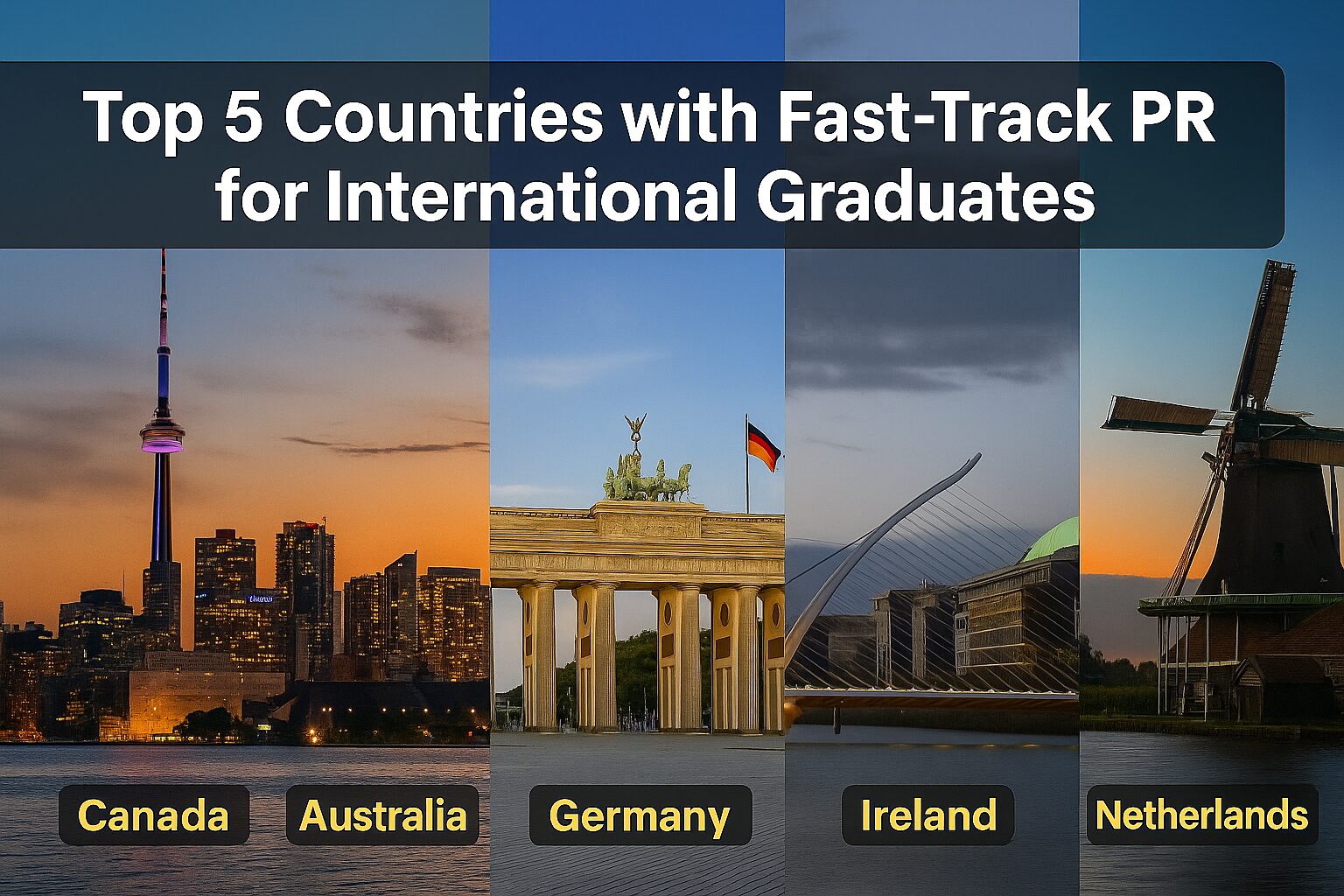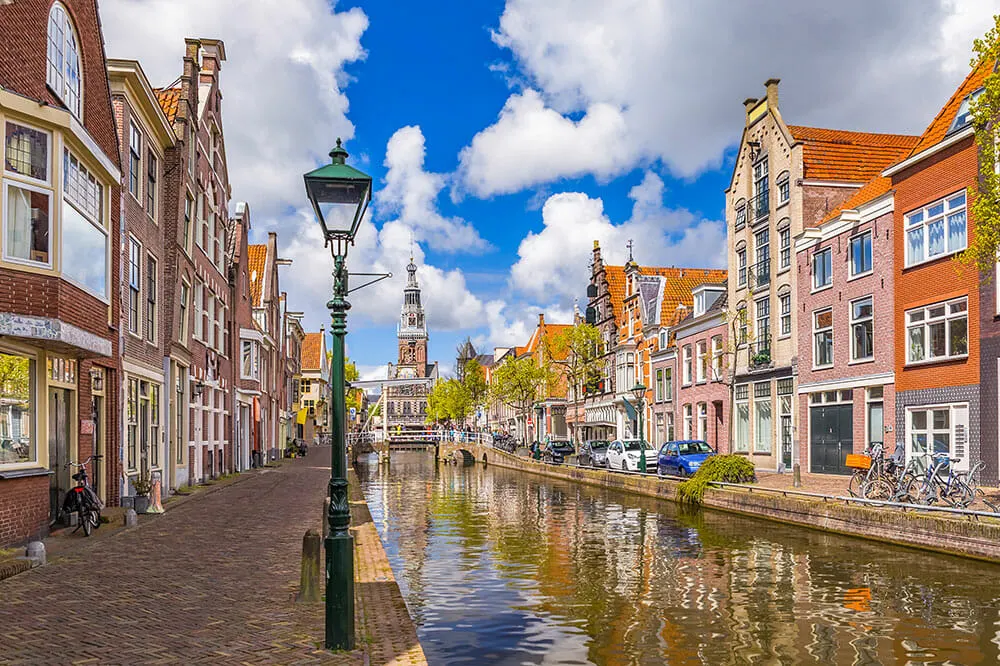
Your 2026 Roadmap: Fast-Track PR Countries for International students
That dream of studying abroad? It’s huge for Indian students, isn’t it? Beyond just getting a world-class education and amazing exposure, we know many of you – and your parents, too – envision a future that goes way beyond graduation day. You dream of building a fantastic career, grabbing valuable international experience, and maybe even securing that prized permanent residency (PR) in a new country. It’s a massive step, and naturally, it’s packed with questions: “Which countries give me the best shot at PR after studying abroad? Can I really find countries with easy PR for international students? What are the absolute latest post-study PR pathways out there?”
Believe us, we totally get those anxieties and those soaring ambitions! At HelpStudyAbroad.com, we’ve had the privilege of guiding over 20,000 students, just like you, towards their global aspirations. We’ve been there every step of the way, from securing those dream admissions to navigating the trickiest visa processes and helping plan their long-term futures. This super detailed guide is here to shed some much-needed light on the countries that are actively looking for talented graduates like you, offering clearer, and yes, often faster paths to permanent residency in 2026.
The Global Talent Search: Why Countries Are Opening Doors for YOU!
In today’s super fast-paced global economy, nations are really waking up to the incredible value that international graduates bring to the table. You’re not just students anymore; you’re future innovators, skilled professionals, and vital contributors to their economies and societies. This realization is sparking some major shifts in immigration policies worldwide, making it an incredibly opportune time for anyone looking for permanent residency for international students.
Skilled Worker Shortages are Paving Your Way In
Across so many sectors – from cutting-edge technology and vital healthcare to engineering and even skilled trades – many developed countries are facing real gaps in their labor force. Instead of just trying to attract workers from abroad, they’re now looking right at their own educational institutions. By keeping brilliant international graduates, who are already familiar with their culture, language, and work environment, they can fill these gaps much more effectively and quickly. For you, this means genuinely more favorable immigration rules for graduates.
Post-Pandemic Rebuilding Means High Demand for Your Skills
The recent global pandemic really highlighted how delicate supply chains and job markets can be. As countries rebuild and reshape their economies, the demand for adaptable, globally-minded, and highly qualified individuals is absolutely soaring. International graduates are seen as a critical piece of this recovery puzzle, bringing fresh perspectives and vital skills. This has led many nations to actively boost their work-to-PR options, making that graduate visa to PR transition smoother than ever before!
The Top 5: Countries with Fast-Track PR for International Graduates in 2026!

When you’re thinking about your options for PR after studying abroad, it’s super important to look beyond just that initial graduate visa. We’ve pinpointed five amazing countries that consistently offer strong, clear, and relatively quick pathways to permanent residency for international graduates. While “fast-track” is always a bit relative and depends on your unique situation, these nations have really well-defined programs specifically designed to keep global talent like you! Here’s a quick comparison:
| Country | Key PR Programs | Avg. Transition Time to PR (Post-Study) | Key Requirements (IELTS, Education, Job) | Points System Overview |
|---|---|---|---|---|
| Canada | Express Entry (FSWP, CEC), PNPs | 6-18 months (after 1 year work exp.) | IELTS 6.0+ (CLB 7+), Post-secondary education, Canadian work experience often key. | Comprehensive Ranking System (CRS) based on age, education, language, work experience. |
| Australia | Skilled Independent (189), Nominated (190), Regional (491) | 12-24 months (after skilled work experience) | IELTS 6.0-7.0+ (Competent/Proficient English), Skill assessment, relevant occupation. | Points system based on age, English, skilled employment, qualifications, state nomination. |
| Germany | EU Blue Card, Skilled Immigration Act | 21-33 months (after work on Blue Card) | German B1/B2 (often required), University degree, Job offer matching qualification. | Not a points system, but eligibility criteria for specific permits. |
| Ireland | Critical Skills Employment Permit, Stamp 4 | 2-5 years (after 2 years on Critical Skills) | IELTS 6.5+ (for some jobs), Degree, Job offer in critical skills list. | Eligibility-based on job type, salary, and duration of stay. |
| Netherlands | Highly Skilled Migrant Permit, Orientation Year Visa | 5 years (continuous residence) | IELTS 6.0+ (for some jobs), University degree, Job offer meeting salary thresholds. | Eligibility based on highly skilled occupation, salary, and duration. |
#1 Canada: Your Go-To for PR Success!

Canada has been a reigning favorite for Indian students for ages, and honestly, for all the right reasons! Its super welcoming immigration policies, a thriving job market, and that enviable high quality of life make it incredibly appealing for anyone dreaming of permanent residency for international students. The Post-Graduation Work Permit (PGWP) is a game-changer, letting graduates gain invaluable Canadian work experience – often the absolutely crucial step towards PR!
-
Express Entry System: How Your Points Add Up (CRS Explained)
Canada’s Express Entry system is their superstar immigration program, handling applications for several economic immigration streams, like the Federal Skilled Worker Program (FSWP) and the Canadian Experience Class (CEC). It uses something called the Comprehensive Ranking System (CRS), which basically awards you points based on things like your age, education, language smarts (IELTS scores are HUGE here!), and any Canadian work experience you’ve got. Seriously, getting Canadian education and work experience skyrockets your CRS score, making PR after studying abroad a totally realistic goal. Want more details? Check out official Canadian government immigration pages like Immigration, Refugees and Citizenship Canada.
-
Provincial Nominee Programs (PNPs): Your Provincial Advantage
Beyond Express Entry, Provincial Nominee Programs (PNPs) offer another amazing route. Each Canadian province and territory has its own unique immigration programs, all designed to meet their specific local job market needs. So, if your skills are highly sought-after in a particular province, you might just get a provincial nomination! This adds a whopping 600 points to your Express Entry CRS score – practically guaranteeing you an Invitation to Apply (ITA) for PR. These truly are fantastic post-study PR pathways!
-
Rohan’s Story: How a Software Engineer Got PR in Just 6 Months!
Meet Rohan from Bengaluru. He chased his dream of a Master’s in Computer Science at the University of Waterloo. After graduating, he landed a fantastic job as a Software Engineer in Toronto. Once he’d clocked a year of valuable Canadian work experience, our team at HelpStudyAbroad.com jumped in to help him fine-tune his Express Entry profile. With his Master’s degree, a brilliant IELTS score (8.0!), his relatively young age, and that crucial Canadian work experience, Rohan’s CRS score was incredibly competitive. He received an ITA within weeks, and after submitting his complete application, he secured his PR after studying abroad in an unbelievable 6 months! His journey is truly a shining example of a fast-track graduate visa to PR transition.
#2 Australia: Land of Skilled Migration (and Sunshine!)

Australia offers such a vibrant, multicultural vibe and a buzzing job market, especially if you’re in tech, healthcare, or engineering. The country offers really generous Post-Study Work visas (some qualifications even get you up to 5 years!), giving international graduates plenty of time to gain experience and then apply for permanent residency for international students through various skilled migration programs. The big secret here? Making sure your occupation is on those crucial skilled occupation lists!
-
General Skilled Migration (GSM) Visas: Your 189, 190, and 491 Options
Australia’s General Skilled Migration (GSM) program is points-tested and specifically designed to welcome skilled workers who aren’t sponsored by an employer or family. The main visa types you should know about are:
-
Skilled Independent Visa (subclass 189):
This is your chance if you don’t need a nomination from a state/territory or an employer. It’s all about your skills and points!
-
Skilled Nominated Visa (subclass 190):
Here, you’ll need a nomination from an Australian state or territory government. This is often for occupations that are specifically in demand in that region, and it usually means committing to live in that state for a few years.
-
-
Skilled Work Regional (Provisional) Visa (subclass 491):
-
This is a provisional visa that needs a nomination from a state/territory or sponsorship from an eligible relative. It leads to PR after three years of living and working in a designated regional area. These are often considered some of the countries with easy PR options, especially if you’re open to exploring regional life! You can check all the detailed requirements on the Australian Department of Home Affairs website.
State Nomination and Regional Opportunities: Your PR Boosters!
Many Australian states are actively looking for international graduates to fill their specific labor needs. Plus, here’s a tip: studying in a regional area can seriously boost your PR prospects! The Australian government offers extra points and super streamlined pathways for regional graduates, making it one of the most straightforward post-study PR pathways available.
Meera’s Journey: From Marketing Grad to Australian PR!
Let’s talk about Meera from Mumbai, a bright marketing graduate from the University of Melbourne. She wisely used her Post-Study Work visa to land a fantastic role as a Digital Marketing Specialist. After two years of solid experience and with a proficient IELTS score (a great 7.0!), she came to us for advice. We helped her with her skills assessment and Expression of Interest (EOI) for the Skilled Nominated (subclass 190) visa for Victoria. Her relevant experience and that crucial state nomination were her golden tickets! Meera received an invitation and successfully secured her Australian PR, and guess what? She’s still thriving in her career in Melbourne! Her journey truly shows how understanding those immigration rules for graduates can lead to incredible success.
#3 Germany: Your Gateway to European Engineering and Tech!

Germany, known for its world-class engineering and tech sectors, often offers tuition-free or super low-fee education at its public universities – making it an incredibly tempting destination! While its PR pathway might initially seem a bit longer than, say, Canada or Australia, its clear work-to-PR options and incredibly strong economy make it a really solid choice for anyone committed to a long-term future in Europe.
The Skilled Immigration Act: Making Your Path Easier!
The German Skilled Immigration Act, which fully kicked in during 2024, has seriously smoothed out the pathways for skilled workers, and yes, that includes international graduates like you! This act simplifies the recognition of your foreign qualifications and opens up even more opportunities for qualified professionals to live and work in Germany. For graduates, holding an EU Blue Card (which is for highly qualified professionals with a recognized degree and a job offer meeting certain salary levels) can lead to permanent residency for international students in as little as 21 months if you’ve got good German language skills (B1), or 33 months if you’re a bit less proficient (A1). Want to deep dive? Check out Make it in Germany.
Your Job Seeker Visa and the Clear Road to PR!
After you graduate from a German university, you’re eligible for a fantastic 18-month Job Seeker Visa. This gives you ample time to find employment that perfectly matches your qualifications. Once you land that job, you can smoothly transition to a work permit, like the highly sought-after EU Blue Card or a general employment visa. After the required period of employment (remember, 21-33 months for Blue Card holders!), you can then apply for a settlement permit – that’s your permanent residency! It’s a beautifully clear graduate visa to PR transition.
Arjun’s Success: From Engineering Student to German PR!
Arjun from Chennai, who studied Mechanical Engineering at TU Munich, snagged a dream job with a leading automotive company during his Job Seeker Visa period. He made it a top priority to learn German diligently, even achieving a great B1 level! After 21 months of working under an EU Blue Card, he was perfectly eligible to apply for his settlement permit. We were right there, helping him navigate all the extensive documentation and the entire application process. Today, Arjun is a proud permanent resident, thriving in Germany’s engineering heartland. His commitment to language learning was absolutely a critical factor in his swift path to PR after studying abroad!
#4 Ireland: Europe’s Rising Star for International Graduates!

Ireland, especially buzzing Dublin, has really emerged as a major European tech powerhouse, often nicknamed the “Silicon Valley of Europe.” This dynamic economy, combined with its super friendly English-speaking environment, makes it a truly compelling choice for Indian students. While it might not be as well-known for immediate PR as, say, Canada or Australia, Ireland definitely offers clear post-study PR pathways, particularly for those of you in critical skills sectors.
-
Your Graduate Scheme Visa and Booming Tech Opportunities!
After graduating from an Irish higher education institution, non-EEA students like you can apply for the Third Level Graduate Scheme (Stamp 1G). This amazing visa allows you to stay in Ireland for up to 12 or 24 months (depending on your qualification level) specifically to look for a job. This period is super important for securing a role in an eligible occupation, especially within Ireland’s booming tech, pharmaceutical, and financial services sectors – it truly sets the stage for your work-to-PR options! For more insights, dive into the Irish Immigration Service website.
-
The Critical Skills Employment Permit: Your Direct PR Path!
The main pathway to PR in Ireland for graduates is through the Critical Skills Employment Permit. This permit is designed for highly skilled professionals in occupations where Ireland has a real shortage. If you manage to secure a job that’s on the Critical Skills Occupations List and you hold a relevant degree, you can apply for this permit. The best part? After holding a Critical Skills Employment Permit for two years, you become eligible to apply for Stamp 4, which grants you long-term residency and is a massive leap towards permanent residency for international students in Ireland!
-
Priya’s Triumph: A Pharma Grad Making it Big in Dublin!
Priya from Hyderabad, who completed her Master’s in Pharmaceutical Science at Trinity College Dublin, is a fantastic example. During her graduate visa period, she landed a dream role as a Research Scientist with a global pharmaceutical company – a field that’s squarely on the Critical Skills list! We were there to assist her in applying for the Critical Skills Employment Permit. After two successful years of working on this permit, she was perfectly eligible for Stamp 4. Priya is now well on her way to securing her Irish PR, proving that if you pick the right field and gain relevant experience, getting PR after studying abroad in Ireland is definitely achievable!
#5 Netherlands: Innovation, Culture, and a Future!

The Netherlands, famous for its innovation, vibrant economy, and incredibly high English proficiency, is becoming an increasingly popular spot for international students. While the direct path to PR might require a slightly longer commitment than some other countries, its unique “Orientation Year Visa” makes it such a welcoming place for graduates to really kickstart their careers and steadily move towards permanent residency for international students.
-
Your Orientation Year Visa: Finding That Perfect Job!
Once you graduate from a Dutch university, you can apply for the “Orientation Year Visa” (also known as the “zoekjaar” or search year visa). This 12-month permit gives you a super valuable opportunity to seek employment in the Netherlands without initially needing an employer to sponsor you. This is your fantastic window to find a job that qualifies you for a Highly Skilled Migrant visa, which is a crucial step for long-term residency and eventually, PR. Talk about a clear graduate visa to PR transition strategy!
-
Highly Skilled Migrant Scheme: What You Need to Know
Once you land a job that meets the salary requirements for a Highly Skilled Migrant, your employer can then apply for this permit on your behalf. After five continuous years of holding a valid residence permit (like the Highly Skilled Migrant permit) and ticking off other boxes, such as Dutch language proficiency (A2 level), you can apply for a permanent residence permit. This well-structured system of work-to-PR options truly makes the Netherlands a stable and secure choice for your long-term plan. For all the nitty-gritty details, head over to the Dutch Immigration and Naturalisation Service (IND).
-
Siddharth’s Unique Path: An Entrepreneur’s Journey to PR!
Siddharth from Delhi, with a Master’s in Entrepreneurship from Erasmus University Rotterdam, took a truly unique route! He used his Orientation Year visa not just to find a job, but to actually launch his very own tech startup! After successfully running his venture for five years, diligently meeting all tax and residency requirements, he applied for his permanent residency. His sheer dedication to integrating into Dutch society and building a thriving business showcased a unique, albeit a bit longer, post-study PR pathway. And yes, HelpStudyAbroad was right there, providing guidance on those complex business visa requirements and his eventual PR application!
Key Things to Ponder When Picking Your PR Destination
Choosing the perfect country for PR after studying abroad is a super personal decision, and trust us, it’s a big one! It’s not just about finding the absolute fastest pathway, but more importantly, about discovering a place where you can genuinely thrive and be happy. So, let’s think about these vital factors together:
-
Language: Are You Ready to Learn? (and Support if Not!)
While most courses abroad are taught in English, securing permanent residency often means you’ll need some level of proficiency in the local language, especially in non-English speaking countries like Germany or the Netherlands. Learning the local language not only boosts your PR chances but also makes daily life so much easier, opens up more job opportunities, and helps you truly connect with society. Countries that offer strong integration support programs can really make this transition feel smoother for you!
-
Your Field’s Future: Are There Jobs Waiting for You?
This is, hands down, one of the most critical factors. Seriously, do your homework! Research the demand for your specific qualifications and skills in each country you’re considering. A country might seem to have “easy” PR, but if there aren’t many jobs in your field, securing employment – which is a must for most post-study PR pathways – will be tough. Look for regions or cities where your industry is booming. Our insights into job search strategies for Indian students can be incredibly helpful here!
-
Cost of Living vs. Quality of Life: Finding Your Balance
It’s smart to think about the cost of living compared to how much you could potentially earn. A higher salary might sound great, but it could easily be eaten up by higher living expenses! Also, consider things like healthcare, public transport, how safe you’ll feel, and cultural amenities. Will you truly be comfortable and happy living there long-term? Taking this holistic view is essential for a successful permanent residency for international students experience. We even have resources like our Cost of Living Analysis to help guide you!
Your Step-by-Step Playbook: Preparing Your PR Application!
No matter which country you choose, that path to PR after studying abroad needs careful planning and some smart steps. Here’s a general guide to get you started:
- Step 1: Pick Your Program Smartly: Based on your field of study, language skills, and career dreams, figure out the best PR pathway for you (think Express Entry, GSM, Critical Skills Permit, etc.).
- Step 2: Get That Key Work Experience: Most pathways require you to have some skilled work experience after graduating. So, focus on landing a job in a field that’s in high demand!
- Step 3: Ace Your Language Tests!: Hit those required IELTS or local language test scores. Remember, higher scores often mean more points or even faster processing! Our IELTS Preparation Guide is here to help you shine!
- Step 4: Get Your Skills Certified: For countries like Australia, you’ll need a positive skills assessment from the relevant authority. Don’t skip this!
- Step 5: Gather All Your Documents, Perfectly!: This means educational transcripts, work experience letters, language test results, ID, police clearances, and medical examinations. Accuracy is absolutely key!
- Step 6: Submit Your Expression of Interest (EOI): For points-based systems, this is your initial application where you tell them you’re interested in immigrating.
- Step 7: Finally, Apply for Permanent Residency!: If you receive an Invitation to Apply (ITA) or meet the eligibility for a direct PR pathway, it’s time to submit your formal application!
Documents & Eligibility: Don’t Let Them Overwhelm You!
This phase can feel a bit overwhelming, we know! Every single document needs to be accurate, properly verified, and often even translated. It’s not just about collecting them, but making sure they perfectly match the precise criteria set by immigration authorities. Understanding those subtle nuances in immigration rules for graduates? That’s exactly where expert guidance becomes absolutely invaluable!
Maxing Out Your Points: Every Point Counts!
For points-based systems (like Canada’s Express Entry or Australia’s GSM), seriously, every single point counts! Factors like having higher education degrees, amazing language scores, relevant work experience (especially Canadian or Australian!), provincial nominations, and even choosing to study in regional areas can dramatically boost your score. Our counselors are wizards at helping you pinpoint areas where you can maximize your potential, truly turning your graduate visa to PR transition into a super successful reality!
Your Secret Weapon: Immigration Consultants (Like Us!)
Navigating the intricate world of international immigration laws can feel incredibly daunting. But honestly, engaging an experienced and trustworthy immigration consultant, like us at HelpStudyAbroad.com, can make all the difference. We’re here to give you end-to-end support, from helping you understand all those tricky visa policies (including our super helpful visa application guides!) to preparing your entire application, ensuring everything is compliant, and ultimately, giving you that priceless peace of mind. Our expertise significantly cuts down the chances of errors or delays, helping you achieve PR after studying abroad smoothly and efficiently!
Suggested Readings (Dive Deeper!)
Your Burning Questions Answered (FAQs!)
Q: Which country has the easiest PR for international students?
A: Honestly, “easiest” depends on *your* unique profile! But, if we’re talking clear and accessible pathways, Canada often comes up first, especially with its Express Entry and PNPs, particularly for those with Canadian education and work experience. Australia also has some strong options, especially through its General Skilled Migration programs. Your specific qualifications and what you’ve studied will play a huge role in how “easy” your PR after studying abroad journey feels!
Q: What are the IELTS requirements for PR in Canada?
A: Generally, for Express Entry, you’re looking at a CLB (Canadian Language Benchmark) 7 minimum for the Federal Skilled Worker Program. This usually translates to an IELTS 6.0 in each band. For the Canadian Experience Class, requirements can vary, but you’ll still need a good score. Remember, higher scores mean a sweet boost to your CRS points!
Q: Do I need a job offer to apply for PR in Australia?
A: Well, it’s not always a must for *all* programs! The Skilled Independent Visa (subclass 189) is actually designed for those who don’t have a job offer or state nomination. However, having a job offer or a state/territory nomination (for subclass 190 or 491) can add some serious points to your application and definitely boost your chances for permanent residency for international students.
Q: How can I improve my CRS score for Canadian Express Entry?
A: Want to bump up your CRS score? Here’s how: try to get a higher score on your language tests (maybe retake IELTS!), gain more skilled work experience (especially Canadian experience!), go for a higher education degree (like a Master’s), secure a provincial nomination, or even land a qualified job offer validated by an LMIA. Every little bit helps!
Q: What are the in-demand skills in Germany for PR?
A: Germany really needs folks in STEM fields (Science, Technology, Engineering, Mathematics)! We’re talking IT specialists, engineers, and healthcare professionals. Other hot sectors include skilled trades and certain research areas. These fields offer excellent work-to-PR options, so if you’re in one, you’re in luck!
Q: What is the average processing time for PR applications?
A: Oh, processing times can really swing depending on the country and the specific program! Canada’s Express Entry can be pretty fast, sometimes as quick as 6-12 months once you’re invited to apply. Australia usually ranges from 6-18 months. For Germany, Ireland, and the Netherlands, you’re often looking at needing 2-5 years of qualified work experience before you can even apply for PR. So, these are all approximate times for post-study PR pathways.
Q: What are the age requirements for PR programs?
A: Most points-based PR programs (like in Canada and Australia) tend to give more points to younger applicants, usually those under 30-35 years old. While there isn’t typically a strict upper age limit to apply, the points you get for age do decrease quite a bit once you pass a certain threshold. Countries like Germany, Ireland, and the Netherlands focus more on your skilled employment, rather than your age.
Q: How much does it cost to apply for PR?
A: The cost of applying for PR? It really varies quite a bit by country! Generally, you’ll need to account for application fees, right of permanent residence fees, biometric fees, medical exam fees, police clearance fees, and those language test fees. These costs can range from a few hundred to several thousand CAD/AUD/EUR, and remember, that’s not even counting any professional consultation fees.
Q: Can I bring my family with me when I apply for PR?
A: Absolutely, in most cases, yes! Your spouse/partner and any dependent children can typically be included in your permanent residency application, as long as they also meet the eligibility, health, and character requirements. This is a common and wonderful feature across almost all the immigration rules for graduates we’ve listed!
Q: What are the best resources for finding job opportunities?
A: Your best bet? Dive into local job boards (think LinkedIn, Indeed, Seek in Australia, Job Bank Canada, StepStone Germany), tap into your university’s career services, connect with industry-specific recruitment agencies, attend professional networking events, and definitely leverage alumni networks. And don’t forget, tailoring your resume and cover letter to local standards is crucial! Our team at HelpStudyAbroad also provides hands-on guidance for effective job search strategies.
Ready to Take the Leap Towards Your Permanent Residency?
We know, navigating the journey to PR after studying abroad can feel like a maze, but with the right guidance and support, it is absolutely, 100% achievable! At HelpStudyAbroad.com, our 20,000+ success stories aren’t just numbers; they’re a heartfelt testament to our dedication to making your global dreams a wonderful reality. Don’t leave your future to guesswork. Let us personally help you chart a clear, confident path to permanent residency in your dream country. We’re here for you!



